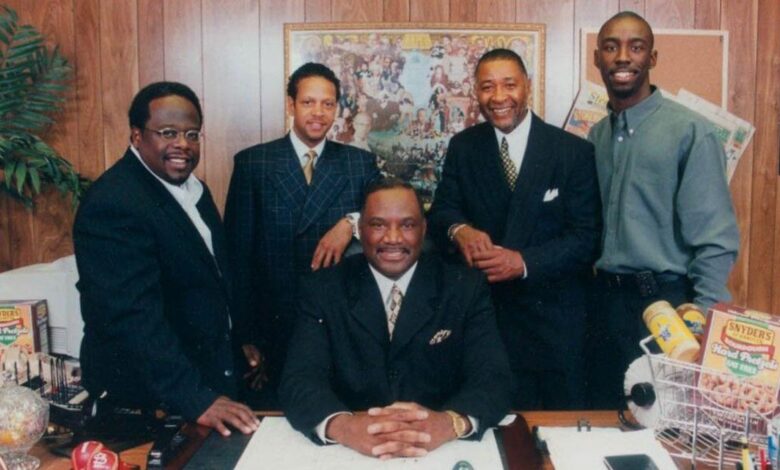St. Louis entrepreneur Sterling Moody passes

“Everyone’s hearts are heavy because we lost a great one but his spirit will live on in all of us,” his obituary read.
Out of that era of economic apartheid, entrepreneur Sterling Moody opened Sterling’s Marketplace — a first (at the time) Black-owned grocery store in Baden. Moody, with his unique blend of charisma, gravitas, showmanship and audacious vision served thousands of customers and inspired several burgeoning Black entrepreneurs.
On April 14, Sterling Moody passed away. According to his family, he never fully recovered after contracting COVID-19 in the first year of the pandemic. As his health steadily declined, his first cousin, Kevin Bryant-founder and president of Kingsway Development-said Moody never lost sense of optimism or his trademark sense of humor.
As his stores opened, closed, reopened, and rebranded, Moody displayed an unwavering, buoyant confidence through it all. When competitors (and haters) counted him out, he bounced back with new ventures and new promotions. Flanked by a who’s-who of investors or avid celebrity supporters including Cedric the Entertainer, baseball great Ozzie Smith, comedians Guy and Joe Torry, Shaquille O’Neal, rapper Nelly and more, Moody epitomized that “never-give-up” entrepreneurial spirit.
Sterling Moody was born on Oct. 10, 1956, to Arthur and Dorothy Moody. His three siblings, Keith, Cynthia, and Julius, all preceded him in death. Moody was born and raised in Kinloch MO. and attended Kinloch High School. He pursued an undergraduate degree in business administration from Southern Illinois University in Carbondale.
By that time, he had already started a career in the grocery store business. At the age of 16, Moody worked as a stock boy for Nationals Supermarkets in the Bell Acres Shopping Center in north St. Louis County. Within seven years, he rose to the rank of assistant manager working at National locations in East St. Louis, Collinsville, Granite City and Geoffrey IL.
Citing his “people skills,” Moody told management he was ready to operate his own store. He was then assigned one of the chain’s more “troublesome and costly” stores at Martin Luther King Drive and Aubert Avenue near the old Sears Building on Kingshighway. Management, Moody said in a 1998 interview with Take Five Magazine, considered him “young and arrogant” and were convinced the urban location would “break him.”
Kenny Fortner was Moody’s boss at the time and would later join the Sterling’s Marketplace team. Speaking with Take Five, Fortner addressed the young upstart’s potential.
“Sterling thought he was the best thing that ever walked this earth. He was young and cocky then, but he was a good worker,” Fortner stressed, adding: “When we first inherited the East St. Louis store it was rated number 46 out of 47 in terms of overall quality. In two years, we raised it to number 15 out of 47 (stores.”
In 25 years with the grocery chain, Moody said he “turned around” several stores but faced constant resistance and pushback from upper management who thought his tactics (though successful) were too unconventional and too expensive. He maintained a strict cleaning schedule and instituted services like carrying groceries to customer’s cars and events like “Western Day”-with pony rides for kids-at his stores which drove up costs and labor hours.
“They weren’t ready for my type of management back then,” Moody told Take Five. “I think they thought I was getting out of control because I acted like an entrepreneur in a corporate environment.”
During that interview, Moody recalled a heated conversation with one of his superiors.
“He took me outside and pointed to the front of the building and asked, ‘Can you tell me what that sign says?’ Moody responded: ‘Nationals of course, so what?’ Intent on making his point, Moody said the supervisor told him: ‘It doesn’t say Sterling’s Market does it? And until it does, you do what corporate tells you to and nothing else!’”
Moody resigned and, for the next 10 years, delved into the chaotic but exciting world of entrepreneurism. Borrowing $5,000 from friends, he opened Supreme Car Care Service on Airport Rd. in Bridgeton. Using the same charm and marketing techniques utilized in the grocery business, Moody soon lined up car dealers, rental companies, and a steady supply of community members as loyal clients. He then opened two other detail shops in University City and at Jefferson and MLK Blvd and launched a cleaning supply and janitorial services company.
During that time, the local grocery store market was changing. Nationals went out of business, selling most of its stores to Schnucks Markets and entrepreneur Jim Gibson of the Family Corporation of America. Moody was offered and accepted the opportunity to manage Gibson’s “New National Markets” in local urban areas. His unusual, rather high-pitched voice and down-home delivery on radio commercials endeared him with locals who, he said, would walk up to him on the streets and treat him like a “long lost friend.”
Yet, still bitten by the entrepreneurial bug, Moody decided it was time to launch his own grocery store. Through friends and contacts in the sports and entertainment industries, he raised enough money to buy property in Baden. In late 1998, he opened Sterling’s Marketplace, a minority-owned “mega-market” that included a grocery store, video and health food store, a dry cleaner, shoeshine parlor, discount department store, banquet hall and, eventually, a nightclub.
For the next 20 years, Moody rode the up-and-down business rollercoaster in a highly competitive grocery business closing and reopening stores ending with an East St. Louis venture called “Neighbor’s Marketplace” in 2018. It closed a year later.
Those who knew Moody best don’t dwell on his setbacks, losses, or business closures. They only speak of his upbeat spirit, his kindness, his support for fellow entrepreneurs and his incredible determination to beat the odds on his own terms.
Bryant credits his cousin, Moody, for giving him his start as marketing director at Sterling’s Marketplace and nurturing his innovative entrepreneurial journey as a major developer. He wasn’t the only one, Bryant insists.
Moody’s obituary read:
“While advancing in his leadership capacity within the company (Nationals), he continued to rise through the ranks as not just an amazing manager but also a marketing sensation thanks to his unforgettable voice and charismatic personality…He was the life of any party, always had the jokes and maintained a tireless spirit of optimism regardless of what he may have been going through personally. He leaves not only an entrepreneurial legacy but also an independent spirit that has motivated many…to follow similar routes and achieve great success.
“Everyone’s hearts are heavy because we lost a great one but his spirit will live on in all of us.”
Sylvester Brown Jr. is the Deaconess Foundation Community Advocacy Fellow.



